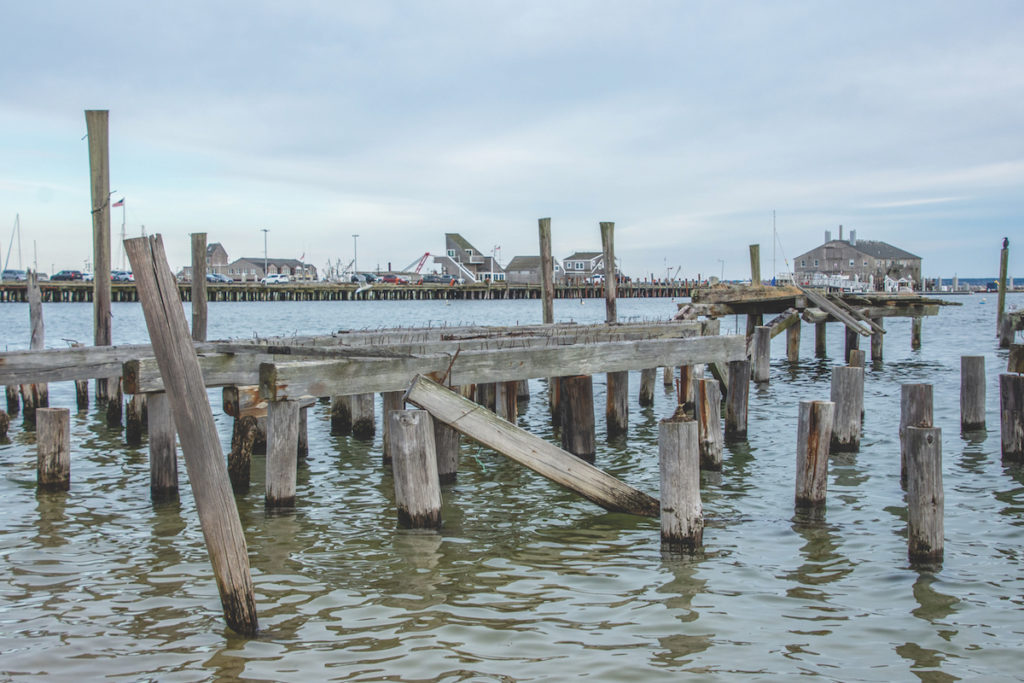
PROVINCETOWN — The multi-million-dollar mixed-use development proposed for the site of the former Old Reliable Fish House off Commercial Street, which sailed smoothly through the town’s permitting process last winter and spring, could be sunk by lawsuits filed by abutters over the narrow alley that serves as sole access to the property.
At issue is developer Christine Barker’s plan to build a 31-room hotel rising 59 feet above the natural grade, a restaurant-bar, and a four-unit condominium complex on the harbor at 227R Commercial St., where the dilapidated old fish house now stands. As a first step, the Old Reliable, which was condemned after a fire in 2015, would be demolished.
Barker’s plan was well received by townspeople and the business community, who said it would get rid of a dangerous eyesore, provide much needed year-round hotel rooms, and bolster the downtown economy.
That plan has been put on hold, however, until two suits filed in Land Court by abutters can be resolved.
Scott Ravelson, who owns 229 Commercial St.; Robert Anderson, who owns the Canteen restaurant next door; and Patrick Patrick, owner of Marine Specialties, filed suit against the Provincetown planning and zoning boards, as well as against Barker and H. Bradford Rose, the Old Reliable Fish House’s current owner.
The businessmen have asked the Land Court to annul the variances and special permits granted by the planning and zoning boards, and to issue an injunction preventing the current or future owners of the fish house property from building the proposed project or others that are similar in scope.
The fish house site has no frontage on Commercial Street. Access from the street is via a narrow alleyway easement, which the plaintiffs argue is inadequate for the proposed use. They also say the width of the easement does not meet state fire codes, posing a safety issue that could endanger the public and their neighboring businesses in case of fire.
Until 1950, 227R and 229 Commercial St. had a single owner, who conducted a large fish processing operation there.
In 1950, the owner sold 229 Commercial St., but retained access to 227R by including an easement in the deed allowing passage to and from the fish house property over a narrow right of way next to 229 Commercial St.
Ravelson now owns the buildings with frontage on the street and leases them to the stores Soft as a Grape and Essentials II. He also owns the alley that provides access to the fish house property.
He and his fellow plaintiffs are simply looking to work with Barker “and not be steamrolled,” Ravelson said. “We have been open that we support redevelopment of the site, as long as it is well thought through. It’s just the scale of this and the lack of communication. There has been zero.”
Ravelson said he wanted to have an outdoor pedestrian marketplace in the alley, but that couldn’t be safely done with the current development plan.
“We’re not going to be adversarial, but we’re saying this has to be done with respect for neighbors and the town,” Ravelson said. “We think the project is way too oversized.”
Barker disagreed, saying the project “will bring immense public benefits to the town and Provincetown community by creating a vibrant waterfront development with a revitalized pier and much needed hotel rooms.”
The rooms, restaurant, and bar will provide jobs and generate tax revenue for the town, while creating a downtown destination for both tourists and locals, Barker said.
“Our vision to create a new, sustainable, and exciting project in keeping with the goals of the town is why the town and the community at large have overwhelmingly supported this venture,” she said.
Land Court Judge Michael Vhay had ordered both sides to try to settle their differences through mediation, according to court documents. After some failed attempts at mediation, the judge ordered both sides in late September to get ready for trial. A pretrial conference has been set for March 19, 2021.
Attorney Amy Kwesell of KP Law, who represents the town, said Barker is the main defendant in the case, since she holds the permits for the project. Kwesell said she monitors the case because two town boards are defendants, but the town is not required to file legal responses to the complaints.
Sarah Turano-Flores, the Hyannis attorney representing Barker and Rose, would not comment. In her legal response to the plaintiffs’ complaints, Turano-Flores denied that the plaintiffs were aggrieved by the planning and zoning board decisions. She has asked the court to dismiss the case and award Barker and Rose legal costs.



